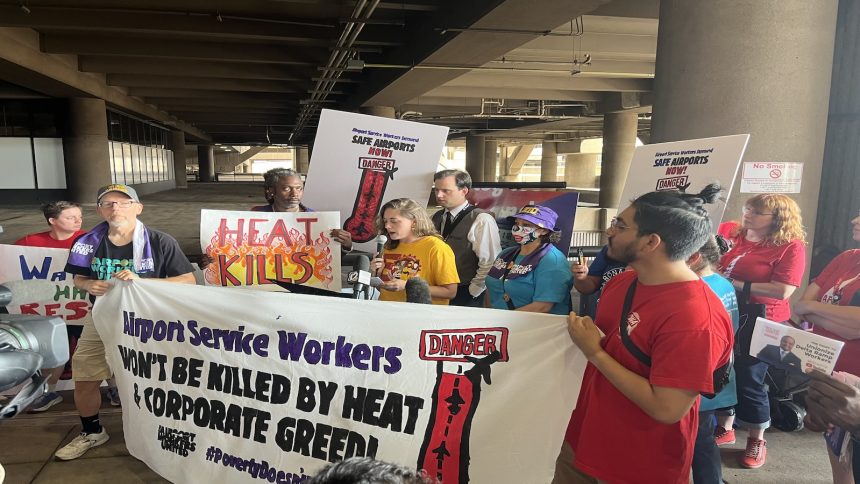For the past two years, Cecilia Ortiz has been employed as a passenger service agent at Phoenix Sky Harbor International Airport. Her daily routine entails walking 10 to 15 miles, navigating ramps, assisting passengers in wheelchairs, and handling luggage. Despite scorching temperatures exceeding 110 degrees Fahrenheit this summer, Ortiz claims she has been denied breaks and water by her supervisors, putting her at risk due to her heart failure. She emphasizes the importance of accessible drinking water, rest areas, breaks, and heat exhaustion training to ensure workplace safety.
Joining forces with laborers from various sectors, including fast-food, retail, and agriculture, airport workers like Ortiz are advocating for on-the-job heat protections from both employers and the federal government. A series of events, such as rallies, town halls, and delegations, are being held in 13 cities nationwide to demand immediate action to safeguard workers from extreme heat conditions.
In response to the escalating threat of heat-related illnesses and deaths in the workplace, organizers have launched “Heat Week” to raise awareness and push for stronger regulations. The recent tragic deaths of workers like Wednesday Johnson and Ronald Silver II underscore the urgent need for comprehensive heat safety measures. Service Employees International Union president April Verrett urges the Biden-Harris administration to finalize and implement a federal heat rule to prevent further loss of life due to heat exposure on the job.
As the climate crisis intensifies, Rep. Greg Casar and other advocates stress the critical importance of federal action to guarantee all workers essential protections like rest breaks and access to water during extreme heat conditions. Proposed federal regulations, such as those put forth by OSHA, aim to set standards for employers to provide cooling areas, hydration, and breaks as temperatures rise, with the hope of preventing heat-related tragedies in the workplace.
With laborers and lawmakers united in their demand for stronger heat protections, the urgency of the situation is undeniable. Despite potential roadblocks, including delays in finalizing regulations and opposition from some officials, the need for swift action remains paramount. By advocating for federal legislation to ensure workplace safety during extreme heat, workers like Ortiz, Parker, and Cardenas seek to hold corporations and policymakers accountable for protecting the health and lives of employees nationwide.






